
Table of Contents
Introduction
Let’s be honest—raising kids is incredible. And exhausting. Sometimes in the same five-minute span. Whether you’re staring at your newborn wondering if you’ll ever sleep again, or trying to decode your teenager’s latest eye roll, you’re not alone in feeling like you need a roadmap. The thing is, parenting isn’t something you can just wing (though we all try sometimes). It changes as your kids grow, and what worked last month might be completely useless today.
Here’s what I’ve learned: understanding how to support your child’s growth—physically, emotionally, and mentally—makes everything easier. You know those moments when you’re wondering if you’re doing this whole parenting thing right? Questions about communication, discipline, and how to take care of yourself while taking care of everyone else? You’re asking the right questions. This guide tackles those real concerns with practical advice that actually works. For parents wanting to build stronger connections with their kids, exploring positive parenting techniques offers some game-changing insights into nurturing those bonds we all want.
Your involvement in your child’s life matters more than you might think. Research backs this up—engaged parents see better academic results and more emotionally stable kids. When you show up for your child’s education, you’re creating an environment where they feel supported and motivated. (And yes, this applies even when homework battles make you question everything.) If you want to dive deeper into this, check out guidance on parental involvement in education for strategies that actually enhance your child’s learning experience.
Now, let’s talk about something that benefits everyone in the family: staying active. Regular physical activity isn’t just good for the body—it’s a stress-buster and mood-booster rolled into one. Your kids watch everything you do, so when they see you prioritizing movement and health, they learn those habits too. Resources like the benefits of regular physical activity can help you figure out how to make movement a family affair. And while we’re on the topic of wellbeing, mental health awareness deserves equal attention. Creating a home where it’s safe to talk about feelings, stress, and anxiety? That’s powerful stuff. You might find mental health awareness resources helpful for building that kind of supportive environment.
What You’ll Learn in This Guide
This guide is built for real parents dealing with real challenges. From sleepless newborn nights to navigating the teenage years, you’ll find expert advice that you can actually use and adapt to your family’s needs.
- Understanding Child Development: Learn about physical, cognitive, emotional, and social milestones to recognize your child’s progress and needs. This foundational knowledge helps tailor your support and interventions effectively.
- Effective Parenting Techniques: Discover communication strategies, discipline methods, and active listening skills that build trust and model positive behavior. Embrace approaches like positive reinforcement to encourage good habits and mutual respect.
- Balancing Parenting with Self-Care: Manage stress and maintain your wellbeing through time management, supportive networks, and self-care practices. A healthy parent can provide stronger support and model balanced living for their children.
- Handling Common Challenges: Gain practical solutions for issues like tantrums, screen time management, and sleep problems. Learn when professional help may be necessary and how to approach these situations calmly and effectively.
We’ll walk through how to adapt your parenting style as your child grows, help them develop emotional intelligence, and keep your family life balanced. (Spoiler alert: perfect balance is a myth, but functional balance is totally achievable.) For new dads who want to jump in confidently from day one, these tips for first time dads cover everything from bonding to supporting your partner.
Got a teenager at home? You’ll want to pay special attention to our section on motivating teens and setting boundaries that actually stick. The teenage years don’t have to be a battleground—promise. For deeper insights into this phase, our tips for parents of teenagers covers communication strategies and emotional support that really work during these crucial years.
Remember, you don’t have to figure this out alone. Building connections with other parents and continuing to learn strengthens your confidence and skills. Consider joining parenting workshops near me or connecting with single parent support groups. You can also find local connections through single parent support groups near me—because having people who truly get what you’re going through makes all the difference.

Parenting? It’s like riding a roller coaster while trying to assemble IKEA furniture—thrilling, challenging, and somehow both rewarding and exhausting at the same time. From those first sleepless nights with a newborn to navigating the mysterious world of teenage emotions, you’re constantly learning on the job. Here’s the thing: understanding how your child grows and develops isn’t just helpful—it’s your secret weapon for building that unbreakable bond while keeping your sanity intact. (Trust me, you’ll need both.) Let’s dive into what really matters when it comes to supporting your child’s journey and mastering the art of effective parenting.
Understanding Your Child’s Development
Ever wonder why your toddler suddenly becomes a tiny tornado one day and a cuddly angel the next? Welcome to child development—where everything is connected and nothing happens in isolation. Your child isn’t just growing taller (though those growth spurts will surprise you). They’re developing physically, mentally, emotionally, and socially all at once. Think of it like a complex puzzle where each piece affects the others.
Watching for those physical milestones—first steps, riding a bike, tying shoes—gives you clues about what’s coming next. But don’t forget about the mental gymnastics happening upstairs. That curiosity about how things work? The endless “why” questions? That’s their brain building the foundation for everything from school success to creative problem-solving later in life. And here’s what many parents miss: emotional and social development is just as crucial. These skills help your child make friends, handle disappointment, and develop that all-important empathy muscle. If you’re curious about how early experiences shape everything that follows, check out why early childhood education is vital—it’s eye-opening stuff.
Now, here’s where it gets interesting. When you really understand how your child develops, you stop taking things personally. That meltdown at the grocery store? Probably not about you—it might just be their developing brain struggling with too much stimulation. You’ll start seeing patterns, anticipating challenges, and celebrating wins with a whole new perspective. Plus, when you’re informed, you can work better with teachers and doctors as a team. Want to take your involvement to the next level? Positive parental involvement in education can make a huge difference in your child’s success.
Key Aspects of Child Development
Keep an eye on these areas—they’re all connected, but each deserves attention:
- Physical Growth and Motor Skills: From those wobbly first steps to mastering a bike, physical development is obvious but important. Encourage active play (yes, even when it means muddy clothes), keep up with good nutrition, and don’t skip those check-ups. Your future athlete or artist needs a strong foundation.
- Cognitive and Learning Abilities: Feed that curiosity! Whether it’s building blocks, bedtime stories, or letting them “help” with cooking, you’re literally building their brain. Those seemingly random questions? Answer them. That’s how problem-solvers are made.
- Emotional Regulation and Social Interaction: This is the big one. Help your child name their feelings, teach them it’s okay to be sad or frustrated, and show them how to work through conflicts. These skills will serve them for life—in friendships, at work, in relationships.
- Communication Skills: Talk to your child. Read together. Listen when they speak (even when it’s the same story for the fifteenth time). Good communication opens doors and builds confidence in ways you might not expect.
Understanding these connected pieces of development gives you the roadmap for supporting your whole child. It’s not about checking boxes—it’s about nurturing a human being who feels secure, curious, and ready to take on the world.
Effective Parenting Techniques
Let’s be real—effective parenting isn’t about being perfect. It’s about creating an environment where your child feels safe, heard, and loved while still learning important life lessons. The magic happens when you balance warmth with structure, flexibility with consistency. Sounds impossible? It’s actually more doable than you think.
Positive reinforcement works wonders, but it’s not about bribing your child or praising everything they do. It’s about catching them being good and letting them know you notice. Setting boundaries isn’t mean—it’s necessary. Children actually feel more secure when they know what’s expected. And communication? That’s your superpower. When children feel heard, they’re more likely to cooperate and open up about what’s really going on in their world.
The best part? You don’t have to figure this out alone. Sometimes taking a step back and reflecting on your approach helps. A parenting styles quiz can offer insights into your natural tendencies and areas for growth. And if you’re feeling overwhelmed (which is completely normal), parenting workshops can connect you with other parents and expert guidance. Remember: asking for help isn’t admitting defeat—it’s being smart.
Key Aspects of Effective Parenting
Focus on these core techniques that actually work:
- Positive Reinforcement: Catch your child doing something right and acknowledge it. This isn’t about constant praise—it’s about recognizing effort, kindness, and good choices. Watch their confidence grow when they know you notice the good stuff.
- Setting Boundaries: Clear rules with consistent follow-through aren’t restrictive—they’re freeing. When children know what to expect, they can focus on growing instead of constantly testing limits. Be firm but fair.
- Active Listening: Put down the phone. Make eye contact. Really hear what your child is saying (and what they’re not saying). This builds trust and shows them their thoughts and feelings matter to you.
- Modeling Behavior: You are your child’s first and most important teacher. Want them to be kind? Show kindness. Want them to handle stress well? Let them see you manage challenges with grace. They’re watching everything.

Here’s the thing about parenting—it’s constantly changing. Just when you think you’ve got one stage figured out, your child moves into the next phase and throws you a curveball. But that’s actually the beauty of it. We’ve covered a lot of ground together in this guide, from understanding how kids develop physically and emotionally to building those crucial social skills. When you really get what’s happening at each stage, you’re so much better equipped to give your child exactly what they need—whether that’s extra cuddles, firm boundaries, or room to spread their wings.
The parenting techniques we’ve talked about? They’re game-changers. Positive reinforcement, clear boundaries, actually listening (really listening) to your kids—these aren’t just nice ideas. They’re the foundation of a relationship built on trust and respect. And here’s something that took me years to learn: taking care of yourself isn’t selfish. It’s essential. When you’re running on empty, everyone suffers. But when you’re balanced and healthy? That’s when you can show up as the parent your kids need.
Those everyday challenges—the meltdowns, screen time battles, bedtime wars—they’re all part of the package. Every parent deals with them. The difference is having strategies that actually work and staying calm when things get crazy (easier said than done, I know). Sometimes you’ll need backup, and that’s perfectly okay. Knowing when to reach out for professional help isn’t admitting defeat—it’s being smart about your child’s wellbeing.
Ready to take things further? Start with positive parenting techniques that’ll help you build even stronger connections with your kids. If you’re looking for hands-on support and want to connect with other parents who get it, check out parenting workshops near me—there’s something powerful about learning alongside people who are in the same boat. Got a teenager? (My condolences and congratulations!) Our tips for parents of teenagers will help you navigate those tricky years with your sanity intact. And because mental health matters for the whole family, take a look at our guide on mental health awareness—it’s never too early to create a home where emotional wellbeing is prioritized.
Look, parenting isn’t about being perfect. (Thank goodness, because none of us would make the cut!) It’s about showing up, learning as you go, and doing your best with what you know right now. Trust yourself—you know your child better than anyone. Stay patient with both them and yourself. Each phase brings its own joys and challenges, and that’s exactly as it should be. The work you’re doing today isn’t just helping your kids navigate childhood—you’re setting them up with the emotional intelligence and resilience they’ll need for life. Take it one day at a time, and remember: help is always available when you need it.
Frequently Asked Questions
-
How can I improve communication with my child?
- Practice active listening by giving your full attention, showing empathy, and encouraging honest dialogue to build trust and openness.
-
What are effective ways to discipline without punishment?
- Use positive reinforcement to encourage good behavior and set clear, consistent boundaries to guide your child’s actions in a respectful manner.
-
How do I manage parenting stress?
- Adopt stress reduction techniques such as mindfulness, exercise, and time management, and seek support from networks of other parents or professionals.
-
When should I seek professional help for my child?
- If your child’s behavioral or emotional challenges persist or worsen despite your best efforts, it may be time to consult a child psychologist or counselor for tailored support.


